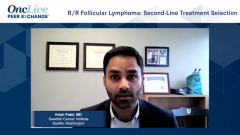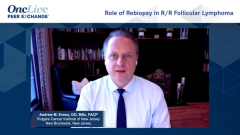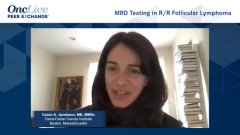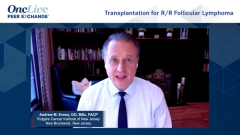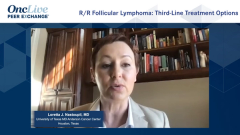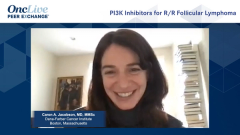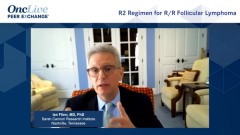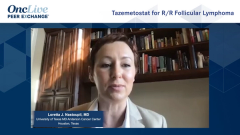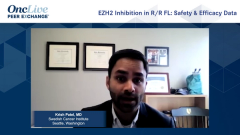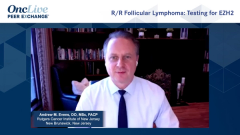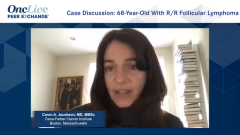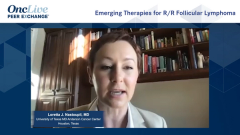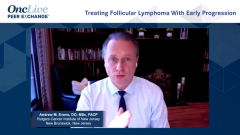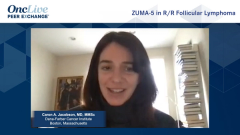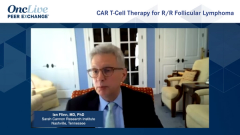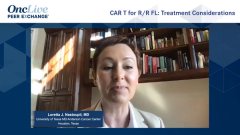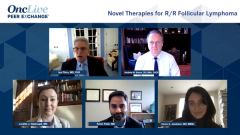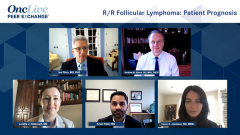
CAR T-Cell Therapy for R/R Follicular Lymphoma
Implications for adding CAR T-cell therapy to the treatment armamentarium for relapsed/refractory follicular lymphoma in the near future.
Episodes in this series

Ian Flinn, MD, PhD: Loretta, I know your institution, The University of Texas MD Anderson Cancer Center, has used a variety of CAR [chimeric antigen receptor] T-cell therapies in follicular lymphoma. There was the ELARA trial that was presented at ASH [American Society of Hematology] in 2020 by Nathan Fowler. I don’t know if you had patients on that trial, but what is your take on that data? They were pretty exciting data as well.
Loretta J. Nastoupil, MD: I share Caron’s enthusiasm. We have both the ZUMA-5 and the ELARA study, and I saw similar things in that the response rates were quite favorable. The toxicity profile is also more favorable. I completely agree with her explanation that this is disease related and is not just us getting better at it. The durability is also very favorable. We don’t have the long-term follow-up we’d like to see to make this have a bigger splash in the treatment landscape, but I really think there is a role for CAR T-cell therapy for some of these patients with follicular lymphoma.
Ian Flinn, MD, PhD: Do you foresee it changing, for instance, your use of autologous transplant or even allogeneic transplant in patients with follicular lymphoma?
Loretta J. Nastoupil, MD: Absolutely. At our center, for any patient who we’re considering a stem cell transplant, we will consider CAR T-cell therapy. I expect the allotransplants, particularly, to disappear.
Ian Flinn, MD, PhD: Yeah. Krish, where do you see this therapy fitting in the landscape of treatment for patients with follicular lymphoma? We talked about the different groups of patients. We spoke about those who do well and tend to have a near-normal life expectancy, and those patients who unfortunately who don’t do well. Do you think it’s going to be used only for those early progressors or those people who are not responding, or can you see a more broad application of it?
Krish Patel, MD: In the short term, for that population of patients we’ve already talked about, who have poor-risk follicular lymphoma and POD24 [progression of disease within 24 months], if you look at the response rates and the outcomes for that group of patients compared with patients who didn’t have those features, it really does seem to be a remarkable therapy. It overcomes some of that poor prognosis. In the long term, as others have alluded to, we really want to understand whether this is a treatment that potentially cures a fraction of patients with follicular lymphoma. That alters this thinking about the risks and toxicity compared with the benefits. In the short term, it is probably among the most promising treatment options we have for patients with POD24. But in the long term, we’ll have to see whether there are other subgroups of patients for whom this therapy is the optimal choice.
Ian Flinn, MD, PhD: Caron, Krish brought up an important thing. Is it too early to know whether there’s a plateau or not in these curves? You had only 17 months of follow-up, or something along those lines.
Caron A. Jacobson, MD, MMSc: We know that it’s better than what we have available to us. We can say that at this point. We don’t know if there’s a plateau in this disease. What we do know is that some of the early, single-institution phase 1 first-in-human studies of these CD19 CAR T-cell therapies did treat some patients with follicular lymphoma, some of which are 10-plus years out. That’s proof of principle that a subset of these patients are going to be cured with CAR T-cell therapy. I just don’t know if it’s going to be 5%, 40%, 70%. I don’t know.
Transcript Edited for Clarity


